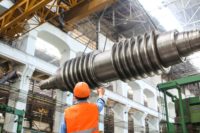Workplace mental health and well-being are critical in every industry and company. Unfortunately, not all companies take the need for mental health support and resources seriously.
The manufacturing industry, in particular, has been deemed one of the worst for mental health and wellness support. As a result, employees and operations are suffering tremendously.
Safety, efficiency, and productivity are just the start of the list of things poor employee mental health can impact in manufacturing. Here’s more on why mental health in manufacturing must be prioritized.
Manufacturing employees are experiencing more anxiety
The conversation around mental health has increased over the last few years, partly because of the pandemic. A bright light was shined on anxiety, specifically. About 30% of people report experiencing anxiety, and that number was around 10% before the pandemic. Like plenty of others in the professional realm, working-class individuals with blue-collar jobs, many of which are in the manufacturing industry, experienced more anxiety.
Whether it’s returning to the workplace, learning their roles again, or the chance of falling ill stressing employees out, and increasing anxiety, it’s crucial for managers to acknowledge this increase and put support measures in place for the sake of safety and productivity in the workplace.
Technology may add more stress
More and more manufacturing companies are implementing technological tools to improve communication and efficiency, and enhance how their employees work.
For example, technologies such as machine learning, IoT (Internet of Things) devices, and robotics are improving accuracy and workflow inefficiencies. Augmented reality (AR) is also making waves in manufacturing. From assembly to training to quality control, manufacturers are finding unique ways to implement AR tech in their operations.
But with more technology comes an expectation that employees become more tech-savvy to use these tools effectively. Employees that have a tough time taking to technological tools will likely experience more stress and anxiety because they’re afraid they won’t meet this expectation.
As a result, they may not be transparent about the support they really need, rush through training, and experience safety issues. Proper training is vital to ease employees’ minds and ensure they use tech tools appropriately.
Highly physical jobs can drain you mentally
Manufacturing positions are usually physically demanding more than anything. Employees are constantly on their feet, sometimes in high temperatures, with equipment on that makes shifts even more physically draining.
Physical exhaustion can affect your mental health. When your body is exhausted, it takes that much more mental effort to keep you going. But eventually, your mind will need a break, too. Conversely, it's usually harder to do things physically when your mind isn't in good shape.
The functions of the mind and body are intertwined. Ultimately, helping your employees nurture their mental health only helps them perform better physically, which is critical in manufacturing jobs.
Employee performance depends on mental health
Manufacturer’s Alliance’s Cost of Mental Health Report reveals that among the manufacturing companies surveyed, 89% feel that productivity is adversely affected by employee mental health.
Presenteeism is when an employee is physically at work but isn’t fully functioning because they’re living with an illness, injury, or other condition. Mental health conditions are responsible for a lot of manufacturing employees being there but not there.
Your employees aren’t nearly as productive as they should be when they’re dealing with presenteeism. And that results in a disrupted workflow that leaves a company unable to perform and keep customers happy.
Offering mental health support will ensure employees are not just at work but wholly present and engaged in their roles.
Your team will be more cohesive
A divided team is one of the worst things for a manufacturing workplace. What one employee does affects the next, and so on. So, it’s essential for them to do well individually and collectively.
But when an employee is living with an unsupported mental health challenge, isolation is one of the most common symptoms. They tend to stay to themselves and not form meaningful relationships with coworkers, making team cohesiveness hard to obtain.
When you prioritize mental health, your employees will become more comfortable with themselves and others in the workplace. And their coworker relationships and those with leadership will become stronger, thus leading to a more cohesive team.
Employee safety depends on it
Workplace injury statistics reveal that “15% of workplace injuries in the United States happen in manufacturing jobs.” There are various causes for those injuries, including mental health-related ones.
Manufacturing roles require a lot of precision, focus, and insightful decision-making. Unfortunately, these things can lack due to poor mental health, resulting in injuries and accidents. Simply put, the manufacturing industry must prioritize employee mental health because it’s a matter of safety.
Conclusion
As we can see, there are many reasons why manufacturing companies should prioritize mental health in the workplace. If you want your employees to be at their best and your operation to flourish because of it, start implementing mental health support in your workplace.
Start with creating a positive workplace culture that normalizes discussing mental health needs and addressing them.




